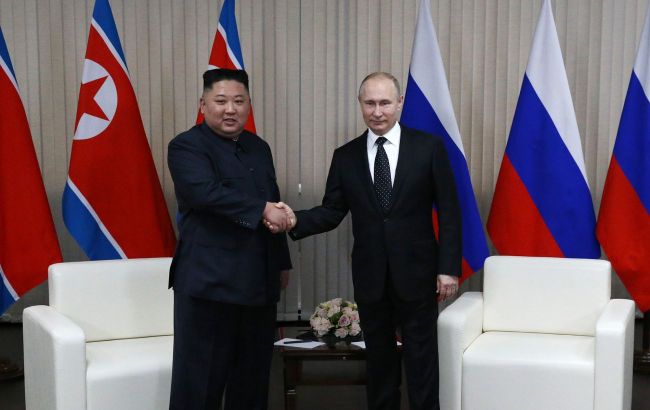Moscow tries to trade access to international finance for DPRK weapons - NYT
 Photo: Putin intends to give Kim Jong-un access to international finance (Getty Images)
Photo: Putin intends to give Kim Jong-un access to international finance (Getty Images)
Moscow is aiming to help Pyongyang gain access to the international financial system in exchange for missiles and ammunition. Russia has already unfrozen North Korean assets worth millions of dollars, according to The New York Times.
The agency stated that in the last month, the White House claimed to have evidence that North Korea supplied ballistic missiles to Russia. According to an analysis by a British security think tank, Pyongyang also sent up to 2.5 million rounds of ammunition to aid in the war against Ukraine.
Although it is unclear whether Russia provided military technology to North Korea, the new banking ties will be another sign of the developing relationship between the two countries. The expansion of this partnership likely emboldened North Korea, as it has recently issued a stream of aggressive threats, according to US officials.
According to intelligence officials, Russia allowed the unlocking of $9 million out of $30 million in frozen North Korean assets held in a Russian financial institution. These funds, they say, will be used by impoverished Pyongyang to purchase crude oil.
According to intelligence officials, a North Korean front company recently opened an account in another Russian bank, indicating that Moscow may be assisting Pyongyang in circumventing UN sanctions, which prohibit most banks from doing business with North Korea. These sanctions have crippled the North Korean economy and essentially cut off the country from international financial networks.
The new bank account was opened in South Ossetia, a region of Georgia occupied by Moscow.
North Korean demands
A high-ranking official, who also wished to remain anonymous, said these arrangements meet US expectations of what North Korea will demand from Russia for arms supplies.
According to experts, access to financial networks is just one item on North Korea's wish list. They say North Korea is most interested in military technology from Russia, such as satellite technology and nuclear submarines.
Closer ties have already borne diplomatic fruit. After North Korean leader Kim Jong-un met with his Russian counterpart Vladimir Putin in eastern Russia last fall, Putin met with North Korean Foreign Minister Ri Son-gwon in Moscow in January.
According to North Korean state media, during this meeting, Putin hinted that he may soon visit Pyongyang, which would be his first trip to the North Korean capital in nearly 25 years.
UN sanctions
Banking agreements could be crucial for North Korea, which relies on imports to support its economy. The relationships could facilitate deals both within Russia and beyond. North Korea could use Moscow's ties with several countries, including Turkey and South Africa, which still trade with Russia despite international sanctions over the war in Ukraine.
If Moscow allows North Korea to use Russian banks or unfreezes assets, the government will "crossed the Rubicon of willingness to deal with North Korea and to be a financial and commercial rogue," said Juan C. Zarate, a former assistant Treasury secretary and expert on financial crimes.
The United Nations and the US have imposed a series of sanctions on North Korea in response to its banned nuclear tests. Banking sanctions have been a challenge for North Koreans and a reason they have resorted to inventive ways to create their financial networks, including using cryptocurrencies, Zarate said.
Financial transactions may be more acceptable for Russia than providing nuclear and other technologies.
While both countries "could be friends with benefits now," said Sue Mi Terry, a former CIA analyst on North Korea, their trust is not so great that Russia would "give away its valued secrets."
Experts said Russia would proceed cautiously, as it still remembers UN sanctions as a permanent member of the Security Council. Russia, they say, may believe it can circumvent sanctions in some dubious way.
In addition to banking relations, Russia may simply exchange goods needed by the North in exchange for its weapons.

